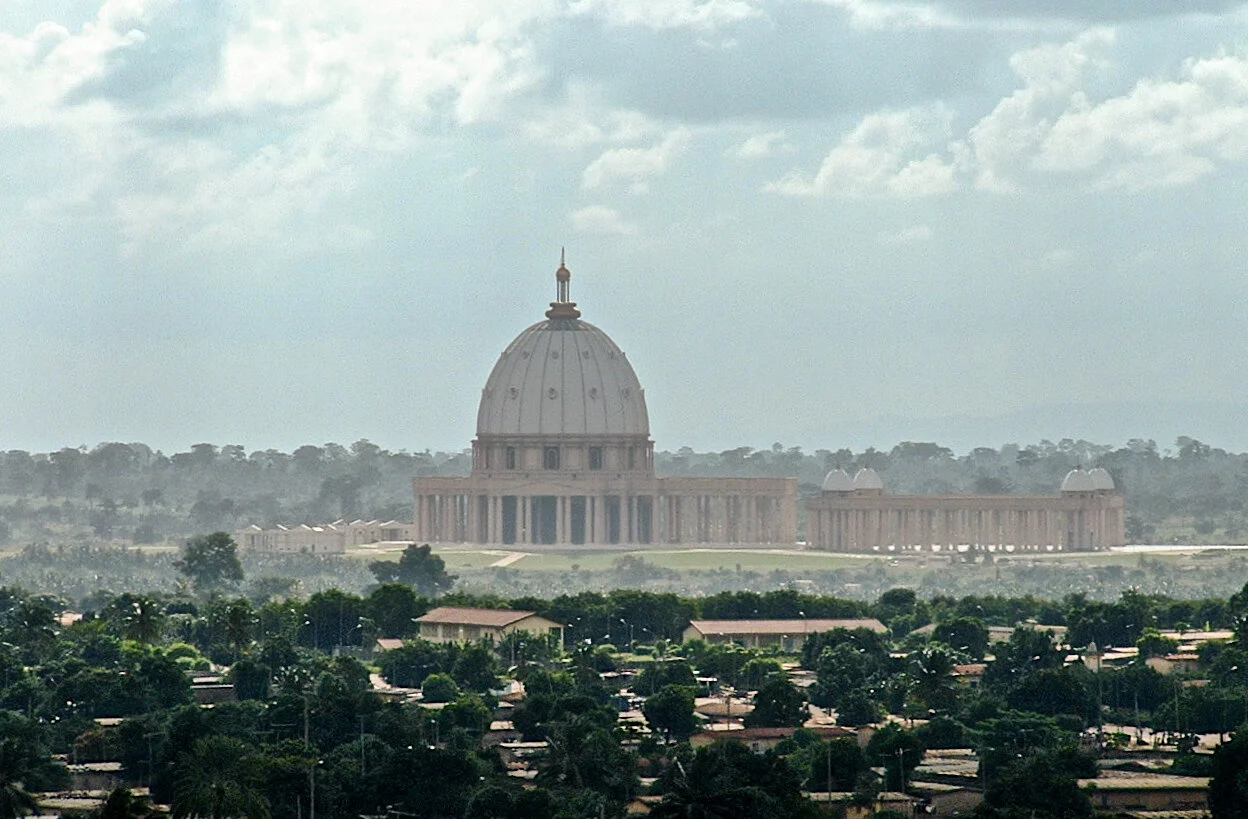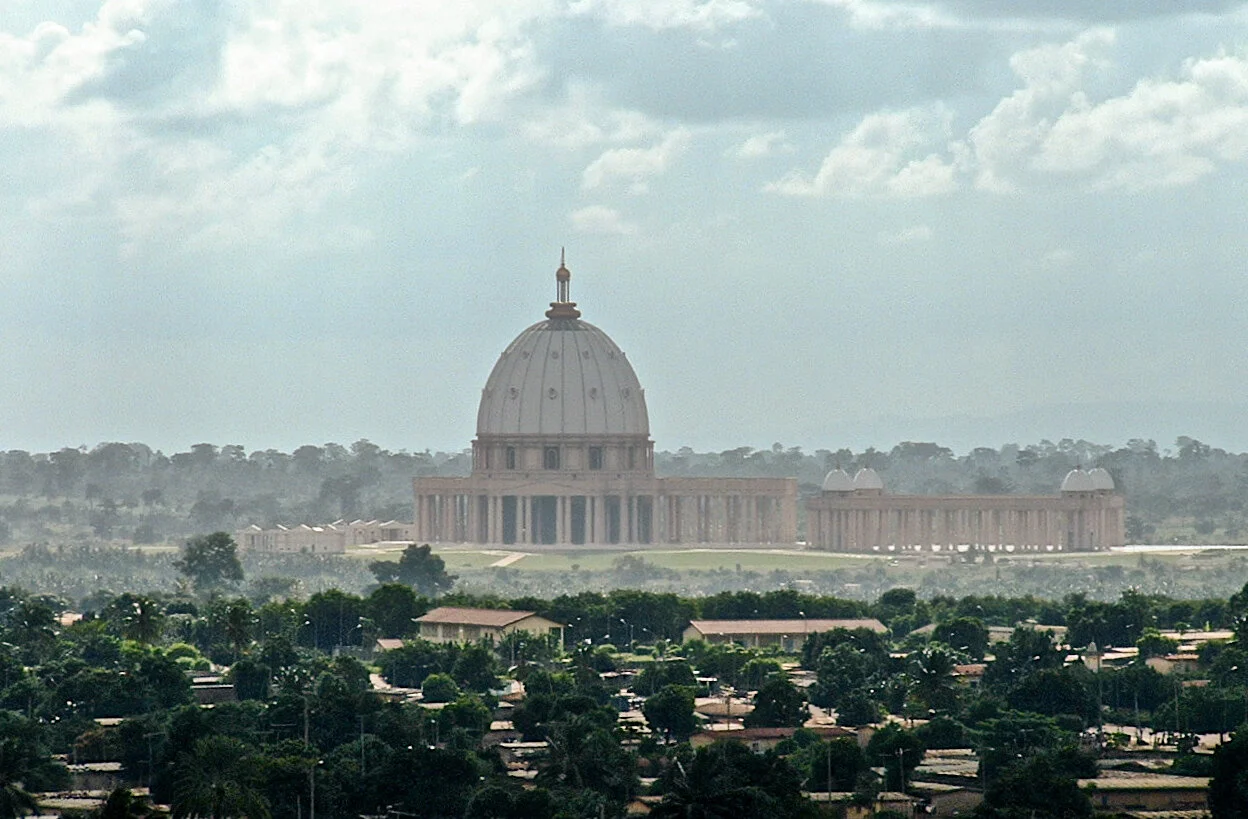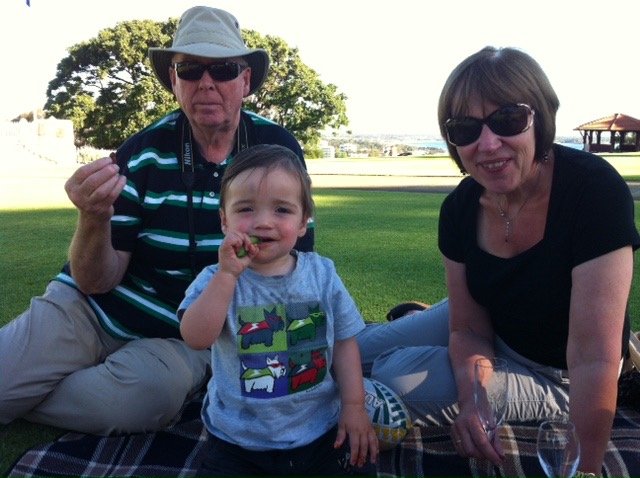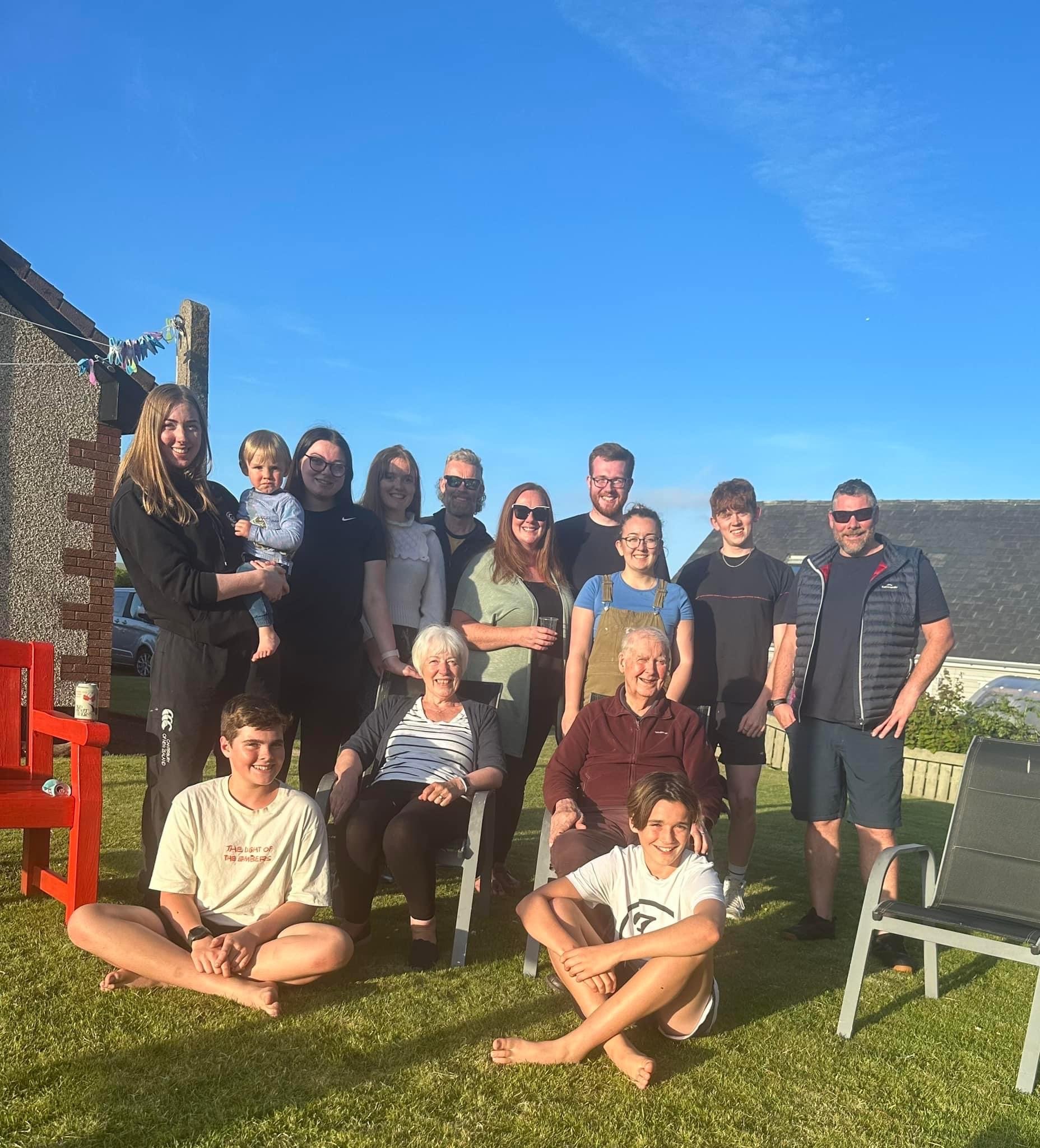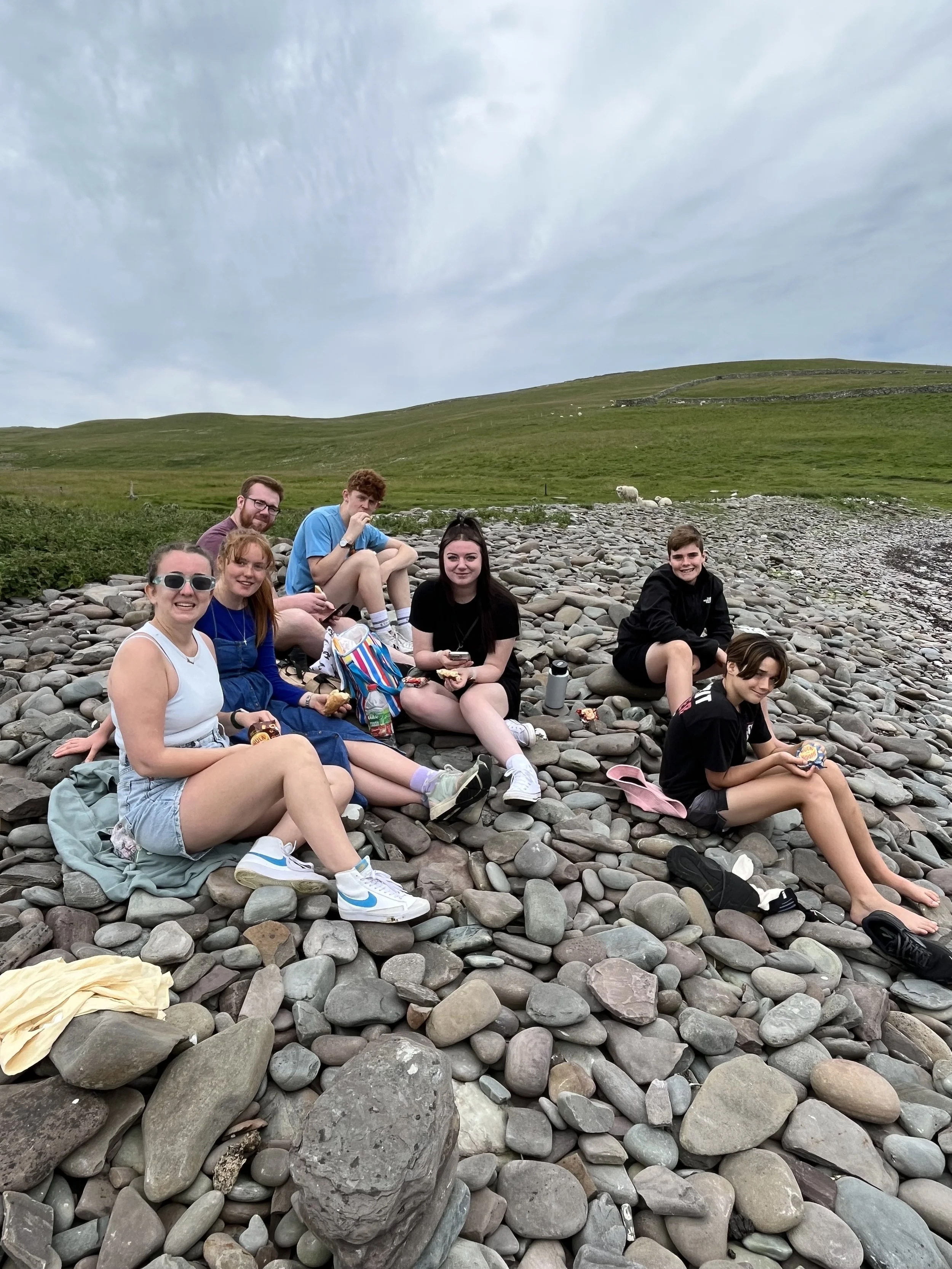About the Ivory Coast…
BASILIQUE de YAMOUSSOUKRO
Ivory Coast factfile
Ivory Coast, or Côte d’Ivoire, is located on the South Coast of West Africa. Its political capital is Yamoussoukro in the centre of the country, while its economic capital is the port city of Abidjan. The official language is French, with around 78 local indigenous languages also being spoken. The country has large populations of Muslims, Christians (primarily Roman Catholic) and various indigenous religions.
Ivory Coast was consolidated as a French colony in 1893 and achieved independence in 1960. The country was well governed by the benevolent dictator, Felix Houphouët-Boigny, until 1993. During his rule the country was relatively stable by regional standards, and established close political and economic ties with its West African neighbours, while maintaining close relations with the West, especially France.
Ivory Coast was an economic powerhouse in West Africa through the 1960s and 1970s because of the production of coffee and cocoa, although it underwent an economic crisis in the 1980s resulting in a period of political and social turmoil. The country experienced a coup d’etat in 1999 leading to two religiously-grounded civil wars, between 2002 and 2007, and again between 2010 and 2011.
“Joshua 1:9
Be strong and courageous. Do not be terrified; do not be discouraged, for the LORD your God will be with you wherever you go.”
SOS SAVE OUR SCHOOL
VAVOUA INTERNATIONAL SCHOOL
An amateur video taken by one of the boys at the school. This was filmed probably a few years before our time there, but it gives a flavour of what life was like at VIS.
We were happily getting on with our lives in Linlithgow when suddenly everything changed in 1984. At the time we subscribed to a monthly magazine produced by the missionary society WEC. In the magazine was an advert entitled ‘SOS Save our School.’ This advert was asking urgently for houseparents to come to Vavoua International School in the Ivory Coast, or the school, an English speaking boarding school for the children of missionaries in surrounding countries, would have to close down.
Unbeknown to each other, both Monty and I had read the advert and felt it jumped out at us. However, with three kids between the ages of 5 and 8, we had dismissed the idea as ridiculous. Finally we spoke about it and realised we both felt the same, that God was calling us to go.
BULSTRODE
GEORGESON FAMILY
Picture taken at Bulstrode before going to Ivory Coast.
Against all the odds, we had never felt so certain of anything in our lives. We rented out our house, Monty resigned from his teaching job at St Kentigern’s Academy, and we were off to Bulstode in Buckinghamshire to complete 4 months of training with WEC before heading out to Ivory Coast.
DANGEROUS DISEASES
So here we were at VIS, Vavoua International School where we spent three and a half happy, rewarding and utterly exhausting years of our lives. We had scarcely arrived there when I contracted dengue fever, the most debilitating illness I have suffered. I actually thought at that point that I had come out there to die and would be buried on the grounds of the school, alongside a previous missionary whose grave was behind the workshop. I remember thinking that at least I had done what I believed God wanted me to do, even if I died in the process. I did recover thankfully, but there were many trials to be faced. One of the most serious was when Mark developed the most deadly form of malaria, falciparum, which could have proved fatal. We had to take him to the pharmacy in nearby Daloa where the pharmacist prescribed quinine, which saved his life.
ARRIVING IN Africa
But first things first, I’ll go back to our arrival in a hot and sweaty Ivory Coast. We had left England in a cold and snowy January, and after a long, tiring flight trying to keep three very hyper and exhausted kids entertained, we arrived in Abidjan and alighted from the jumbo jet. I clearly remember being assaulted by the overpoweringly hot air, feeling as if I was choking as I gasped desperately for breath. I knew immediately there was no way I could live here, and almost turned back into the plane. I also knew, however, that God definitely wanted us to be here, so I reckoned He would help me to learn to breathe, even in this unbearably boiling oven.
We had dressed the kids in shorts and tops, with tracksuits over these. When we alighted from the plane Fiona burst into tears. She says that, although only 6 at the time, she can still clearly remember feeling overwhelmed by such intense heat. Mark raced across the tarmac, in his usual style, followed more slowly by Paul. They were so hot that they shed the tracksuits along the way. We entered the terminal building to find the air conditioning was broken and there were huge queues at customs. Just as our hearts were sinking an angel appeared in the form of Ian Crowe, the WEC coordinator. He whisked us through customs and took us to his home, where he produced chilled glasses of lemonade which tasted like nectar. We had finally made it to Africa, and despite the heat and humidity and the utter exhaustion, I don’t think we had ever felt so happy.
INTRODUCTION TO AFRICAN CULTURE
After a couple of nights in Abidjan with the Crowe family, we were off on our way to Vavoua by bus, a very hot, very dusty, very long and tiring journey! The bus had no set time to leave; it was simply a case of waiting till it was full, and then we were away. It was an altogether enlightening experience and a sudden immersion into African culture, which was noisy, smelly but above all friendly.
Finally, after eight long, humid hours, we arrived at VIS to a very warm welcome. The staff were extremely relieved to have the addition of another two pairs of hands at the school. All fifty kids came racing out in a noisy melee to greet these very white newcomers with the strange accents, overflowing with curiosity as to what we would be like.
Although VIS was an English speaking boarding school for the children of missionaries, it also had a small section for German speaking kids. In addition, the school was open to any English speaking local kids, so there were several from the African Development Bank as well as one Lebanese girl.
HIGHLIGHTS
There were many highlights in our three and a half years at VIS - some exciting, some scary, some sad.
“ “There is a language going on out there – the language of the wild. Roars, snorts, trumpets, squeals, whoops and chirps have meaning derived over eons of expression…we have yet to become fluent in the language – and music – of the wild.”
* Boyd Norton (wildlife photographer, from Serengeti: The Eternal Beginning)
”
Love these African proverbs!
ALL CREATURES GREAT AND SMALL
SNAKES
We were very swiftly introduced to African wildlife. I think it was only on our second or third day at VIS that I looked out of the window of the boys’ dorms only to see an enormous spitting cobra rising up and puffing out just a couple of yards away! Everything seemed to move in slow motion as I stood paralysed, then finally managed to shout for help. Mercifully, one of the African staff, Edouard, appeared out of nowhere, skilfully throwing a stick at its head, and knocking it out. We later encountered several snakes, one of which Monty killed by pinning its head to the ground with a broom. That one ended up in the frying pan and we shared it around to see what snake tasted like. It’s actually pretty dry and chewy, so I wouldn’t recommend it! The first thing you had to learn in Africa was always to look down as you walked, to avoid standing on snakes or scorpions.
SCORPIONS
Talking of scorpions, we only encountered one at close quarters during our time there. We had been away on holiday (we were able to stay in the homes of other missionaries during the school holidays), only to discover a scorpion on our doorstep, kindly waiting to welcome up back.
ANTS
Then there were the ants, oh boy were they busy! You couldn’t risk leaving any sugar or sweet treats out overnight on a counter or they would be there in their swarms. Monty remembers one time seeing a little line of ants coming in through the window, picking up a sugar grain each, and marching out again triumphantly. Then there were the droves of ants outside, forging their way ahead like an army heading into battle. Fiona remembers herself and a friend daring each other to put their hands in the shadows one evening, knowing there was the risk of ants being there. Yes, they were there for sure, in large numbers… and of course Fiona’s hand swelled up and was extremely painful for quite some time!
SCORPION SPITTING COBRA TARANTULA ARMY OF ANTS
Tarantulas masquerading as spiders
There were spiders everywhere, but we regarded them as friends since they helpfully lured the flies and mosquitoes into their webs. Tarantulas, however, were a different story, and needed to be treated with extreme caution. We encountered two that I can recall. One day some of the kids discovered a great big hairy spider outside and took it into the classroom in a jar to show their teacher, Ian Cash. They were fascinated when Ian informed them that this was a wolf spider which, although scary looking, was actually completely harmless, and could safely be allowed to crawl across their hands. Unfortunately, the wolf spider turned out to be a tarantula, who promptly on its release, bit a boy called Alwin John. Alwin’s arm started swelling up and we had to rush him to the little local hospital where an antidote was administered.
My other tarantula encounter was quite amusing. For a year we lived in a mud brick house called Hibiscus. One morning when I went into the bathroom I was met by the sight of a tarantula sitting in the base of the shower staring boldly up at me. In response to my horrified shout of, ‘Tarantula!’, I was met by a groan from a half asleep Monty, still in bed. This was followed by a disparaging grunt, which I interpreted (correctly as it turned out) as meaning, ‘Yeah, right. What are you going to try next to get me out of bed?’ He took a bit of convincing that it was true, before eventually coming to my aid.
DEER
When we arrived at VIS there was a ‘pet’ deer in residence, living in a pen on the school grounds. All the kids loved it and would stroke it through the fence, feeding it with forage gathered in the bush. However, over time, it became more of a hazard than a pet because of the danger of being stabbed by its horns. One day it escaped from its pen and Monty came to the rescue. Seeing himself as something of a ‘Doctor Doolittle’, he had previously befriended the deer and so managed to grab it by the horns, pinning it to the ground until someone came to his aid. Since the deer had become somewhat problematic, a decision had to be made about its fate. A satisfactory solution presented itself: a delegation of African pastors were to meet for a conference at VIS during a school holiday, and what better way to feed them than to provide a tasty venison feast? When the pupils returned from their holidays the deer was nowhere to be found. I'm still unsure as to whether or not they suspected it had ended up in an African cooking pot. If they did, they kept it very quiet…
“As a child my family’s menu consisted of two choices: take it or leave it.
Buddy Hackett”
CHOOKS
Chooks were a large part of our diet. They were introduced to the school by Keith Edwards, the station leader, who decided to buy and rear them. This provided us with an enjoyable treat at the weekends as a change from the traditional African food of rice and sauce. One Christmas we as a family decided to treat ourselves to a roast chicken dinner. In anticipation of this feast, Monty bought five hens from the local market. We kept them in the vacated deer enclosure to ‘fatten them up’ for a while. Monty viewed them daily to observe how they were progressing and would report to the rest of us on the fattening process. To his horror, one day they had mysteriously disappeared and he came rushing indoors in a distraught state: our Christmas dinner had disappeared. On closer inspection, however, it emerged that the hens were still with us; they had simply decided to roost in a tree to give themselves an elevated perspective on life! Unfortunately, our anticipation about a scrumptious Christmas dinner was sadly misplaced. Not only was Monty very ill with some strange virus at Christmas, but the two hens I had carefully roasted turned out to be as tough as old boots. In face we might as well have boiled up our old sandals and tucked into them for dinner! I sincerely hope that whoever ate the other three hens had a bit more luck than us.
CHRISTMAS DINNER
FIVE FRENCH HENS
VISITORS
Ivory Coast Visitors
Randall and Georgeson families at VIS
One of the highlights of our time was the fact that we had several visits from family and friends during our stay. These visits were very special to us, bringing us a connection with home as well as lots of treats unavailable in Ivory Coast. My mother, the indomitable Jeannie Ewen visited twice, once with my cousin David Catto, and once with family friends Margaret Manson. My brother Ian Randall also visited us along with his wife Janice and daughters Ailsa and Moragh. My mother was a source of wonder to the Africans, with her head of white curly hair. They loved her and chattered away happily to her in French while she smiled and nodded, taking it all in her stride.
““Your dream is to feel good; God’s dream is for you to do good.”
― Shannon L. Alder”
Gift gugu mona
‘The most rewarding times are those spent in changing lives, for the sake of humanity.’
Gift Gugu Mona is a South African born poet, philosopher, songwriter and a philanthropist. She has a PhD in Public Health and very passionate about transformation of lives. Dr Mona has written an incredible number of books, including From My Mother’s Classroom: A Badge of Honour for a Remarkable Woman, Daily Quotes about God: 365 Days of Heavenly Inspiration and Daily Inspirational Quotes and Devotions: Towards a Constructive Life.
CHANGING LIVES
I love the words the South African philosopher, Gift Gugu Mona: ‘‘The most rewarding times are those spent in changing lives, for the sake of humanity.’
I hope that during our time spent at VIS we managed to change some lives for the better. This is all we can hope for, that we did what God wanted us to, and in the process, were able to make a positive impact on other people’s lives.
How can I begin to describe our time in Ivory Coast? How can such an amazing, challenging, life changing experience be diluted into a few words? There were times when we were happy and fulfilled; there were times when we felt overwhelmed and unable to cope with another day; there were times when we were unutterably sad; there were times when we felt hurt, angry, frustrated, resentful, questioning, exhausted; there were times when we were homesick for family, friends, familiarity. But through it all we knew we were in the right place, at the right time, that God was with us and would give us the strength that we needed for everything that we needed to do.
All I can say is that our lives were never the same again. We had caught a glimpse of a very different world: one where children were lucky to receive a basic education; a world where people lived a simple life; a world where people became sick through lack of understanding about basic hygiene; a world where people lived in superstition and fear of evil spirits; a world where people turned to the witchdoctor for healing; a world where medicine was too expensive to buy, so people became sick and often died; yet still a world where people’s greeting was an enquiry about the family rather than a complaint about the weather.
home
Our time in Ivory Coast changed us forever, and I hope it had an impact on those we came in contact with also. After our three and a half years were up, we returned home to Linlithgow. I remember being utterly amazed that I could hurry along the road once more. We had become used to the heat and humidity but were unaware just how much it slowed down your pace. It was as if a weight had been lifted off your shoulders, being in a temperate climate once again. We were struck also by the materialism of people in general. We had become used to a very simple lifestyle with very little money; in fact the Ivorians thought we were very rich compared to them! People back home seemed to have so many possessions that it took some time getting used to. For a year after returning home we had to live very simply, buying our clothes from charity shops. Finally we were both able to find work as supply teachers, easing our financial situation. I remember the first things we bought were presents for the kids. They were quite overwhelmed with their shiny new bicycles! We were home, and life had returned to some kind of normality, but Africa would remain forever in our thoughts.

